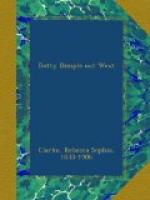“I dinked in a skosh-shell, too; and I fink it’s velly funny out West!” said little Echo.
They were riding behind the other carriage, and at some distance, in order to avoid the dust from its wheels.
“Henry has stopped,” said Mrs. Clifford. “We have reached ’Small’s Enlargement,’ and cannot comfortably ride any farther. The lot next to this is ours, and it is there we are going for the pecans.”
Dotty could hardly wait to be lifted out, so eager was she to walk on the “Small Enlargement.” She spoke of it afterwards as an “ensmallment;” and the confusion of ideas was very natural. It was the place where Grace and the “Princess of the Ruby Seal” had gone, some years before, to have their fortunes told. It was a wild picturesque region, overgrown with tulip trees, Judas trees, and scrub oaks.
CHAPTER IX.
IN THE WOODS.
The party walked leisurely along till they came to a log church, which Mr. Parlin paused to admire. It was in harmony, he said, with the roughness of the landscape.
“I should like to attend service here by moonlight; I think it would be very sweet and solemn in such a lonely place. There would be no sound outside; and as you looked through the open door, you would only see a few quiet trees listening to the words of praise.”
“The evenings here must seem like something holy,” said Mrs. Clifford, “‘the nun-like evenings, telling dew-beads as they go.’”
“O, my shole!” cried Katie, dancing before the church door, and clapping her hands; “that’s the bear’s house, the bear’s house! Little boy went in there, drank some of the old bear’s podge, so sour he couldn’t drink it.” Here she looked disgusted, but added with a honeyed smile, “Then bimeby drank some o’ little bear’s podge, and ’twas so sweet he drank it aw—all up!”
Everybody laughed, it was so absurd to think of looking for bears and porridge in a building where people met to worship. Dotty had just been saying to herself, “How strange that God is in this mizzable house out West, just as if it was in Portland!” But Katie had rudely broken in upon her meditations.
“O, what a Flyaway!” said she; “you don’t do any good.”
“Yes, I does.”
“Well, what?”
“O, I tell ’tories.”
“Is that all?”
“I p’ay with little goorls; and then I p’ay some more; and I wash de dishes. I’ll tell you a ’tory,” added she, balancing herself on a stump, and making wild gestures with her arms, somewhat as she had seen Horace do.
“’Woe to
de Dotties and sons ’o men,
Woe to ’em all
when I yoam again!’”
One wee forefinger pointed up to the sky; the right hand, doubled to a threatening little fist, was shaken at Dotty, while the young orator’s face was so wrinkled with scowls that Dotty laughed outright.




